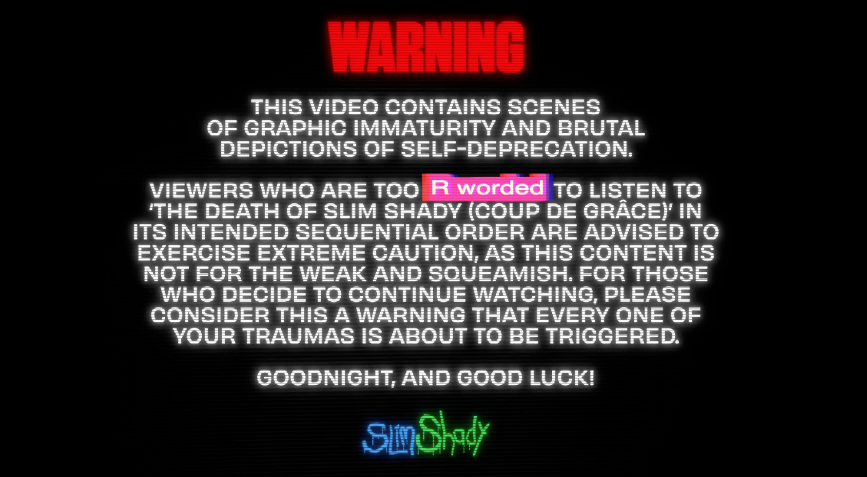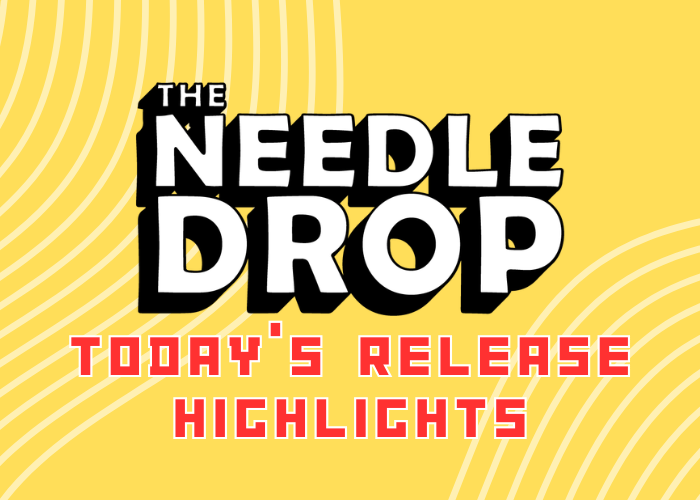Okay, it seems like Eminem is still having a normal one. Being completely normal. Yep, totally normal guy. Eminem, that's him, aka Marshall Mathers.
You may be aware of the fact that he recently released a new album titled The Death of Slim Shady, which is a concept album of sorts where he is at odds with a former, older version of himself, specifically the lewd, crude, offensive, childish Slim Shady character, which he goes through the process of killing on this album. Sorry, spoiler alert.
And I don't know. I mean, you can check my review. I think overall, the idea of this concept on the surface has merit. Considering how many eras there are of Eminem's music, it's not necessarily a bad idea, especially considering that in many ways he has provably grown as a person over the span of his career. But when it comes to the actual substance of The Death of Slim Shady album, as well as the execution of this narrative and idea of killing off the Slim Shady character, it could have been much better executed in a myriad of different ways.
For one, the progression of the entire thing because this death of Slim Shady comes right at track 13 on the album, but then the record just goes on from there for whatever reason that it does. And there are actually several bars post this track 13 moment, where Marshall utters lyrics that pretty much prove he's just as game to piss people off for no goddamn reason as Slim Shady can be. And also that he essentially uses the Slim Shady character to just put out ideas that he's just too chicken shit to get across just on his own. Which I mean, is actually a point of contention that he has with Slim Shady on track 13 right before he kills him.
The literal progression could have been better. The accuracy in the portrayals of of Eminem or Marshall Mathers versus Slim Shady, I think, could have been a bit better and more in-depth, too. Because when you actually look at the substance of records like The Slim Shady LP as well as The Eminem Show, Slim Shady was not merely just this king rap jester who was just saying loads of gamer words. I mean, for sure, in many respects, he was that. That was a part of his appeal. But simultaneously, Slim Shady was a character that was based on a real-life person's experiences, struggling through everyday battles he was having with substance abuse, depression, loathing and self-loathing, as well as a host of other things.
All in all, while Slim Shady is, yes, a very offensive and a very crude and a very mean character, he simultaneously is a portrayal of what happens to somebody when they are deeply disturbed and traumatized and simultaneously don't really have the tools or experience to work through those problems and issues. So they just manifest in some really ugly, horrible ways, which was a very clear part of the Slim Shady narrative when you look at the content of the lyrics on records like The Slim Shady LP. Yes, Slim Shady didn't give a fuck. In a lot of ways, he was embracing nihilism, but mostly because he felt like he was done dirty by the world he was born into.
In Eminem's portrayal of the character on his latest record, I feel like all we're really getting of Slim Shady is like that "FACK" era Slim Shady, where he's just making jokes about Christopher Reeve, and cum, and having gerbels put up your ass. Which, again, for sure is a part of the character, but it's not the entire story. That was a major narrative failing of the new album. And Eminem seems to be embracing that failing even further with this silly little self-interview that has recently been uploaded to Complex's YouTube channel, where it's a conversation between current day Marshall Mathers and what he is portraying to be as the Slim Shady character. This weird, edited, glitchy version of his younger self that looks like it may, on some level, be AI-enhanced. I'm not entirely sure how this short was produced. But let's just say the conversation comes across as very badly acted and highly artificial.
Marshall Mathers: You're like fucking Cartman, Family Guy. It's like you can't be canceled.
Eminem: Look, slut. It's better to get canceled saying shit that everyone's thinking but scared to say than it is getting canceled for some bullshit ass bars.
With the exact angle it's trying to shove down the audience's throat being telegraphed to high heaven with this little warning slide kicking off the entire interview, this video contains scenes of graphic immaturity and brutal depictions of self-deprecation.

This is so goddamn confusing of a narrative coming from Marshall as well as his annoying ass fans, because in numerous ways, they're acting as if the very blatantly spelled-out storyline and weekly-executed concept of this album is just like, 'It's so deep. Nobody can get it. Only the fans are the ones who get it. The fans who enjoy the album are the only ones who get it.' When there are literally numerous skits featuring back-and-forths between Marshall Mathers and Slim Shady that make it very clear what the album is trying to communicate to you. It almost seems like Eminem was afraid of his fans not getting the concept of the album, so he needed to throw those extra bits of acted out storyline just to make it painfully clear what is happening.
Where this idea is coming from, that just the concept, the story is just so beyond comprehension. And on top of it, who is listening to the fucking album out of sequential order? I mean, I suppose there are some, but even in that context, given some of the skits, given the literal lyrics of the tracks that you're listening to, even out of order, the idea behind the album still wouldn't be that hard to grasp. Regardless of what order you're listening to it in, what happens in "Guilty Conscience 2" still happens in "Guilty Conscience 2". The album is packed with context clues. So again, where this idea is coming from that nobody's getting it, nobody's going to get it. It's just bullshit and annoying and makes no sense.
The interview, the conversation, the back and forth makes even less sense as we get deeper into it, specifically lines where it seems like he wants to put everything that's ever been offensive, that's ever been said on any record that has upset people in the past, and put that on the shoulders of Slim Shady while absolving himself of any of that stuff because, "Whoa, that's not me. That's a different guy. That's a long dead version of me who's not around anymore." When the fact of the matter is, there have been plenty of bars, even as recently as stuff on Kamikaze, for example, that you could say, 'Oh, yeah, this is being said by Marshall Mathers, but it offended people.'
It's not as if we just hit the recovery era of Eminem, and then it was just nothing but squeaky-clean Marshall Mather's from there on forward. That is not the full and true story of Eminem's career since mostly separating away from the Slim Shady character. It's not as if we haven't seen multiple times since 2010, Marshall Mathers embracing or bringing back that edgier side of himself for either a laugh or rise out of his audience or as a means of, once again, exploring his past, which is something that he just can't seem to stop doing.
I mean, we have to ask ourselves, what makes this instance of him doing that any better or more significant than any past example of it? Because this record and its content are certainly nowhere near as good as The Marshall Mathers LP, too. I'll say that. Not to mention the fact that Eminem, the character Eminem in this fake interview and conversation, is making some pretty valid points here and there about the necessity and existence of his character and roasting Marshall right to his face.
Meanwhile, Marshall doesn't really have a whole lot to say in response the entire time other than, 'Look at this fucking guy. This guy. Look at him.' As if just sitting there in silence and acting normal is an argument in the face of these accusations that there actually isn't that much separation between you and this character, and that you do, in fact, owe a lot to this era of your career. If you didn't, I don't think you would be referencing back to it again and again and again and again in the way that you so often do.
Unfortunately, this interview and conversation, while like the album, it has a lot of potential as an idea, as something funny and insightful that actually brings more context to the universe of The Death of Slim Shady. But instead it just ends up being another 'What the hell was even the point?' moment. At the end of the day, while it is true, Marshall Mathers isn't 100% Slim Shady, Slim Shady isn't 100% Marshall Mathers, I still feel like there's more overlap between the two than there isn't, or at least these pieces of media surrounding this narrative and this concept are doing a very bad job of creating a genuine separation between the two.
If there is one really good thing to come out of this, at least we got to see Marshall on some level get roasted to his face about the fucking awfully hot coffee pot line. At least he's self-aware about that. All that I can hope is that 10 or 15 years from now, we eventually get to see an even older version of Marshall Mathers arguing with this current-day version and an even younger version of himself and really just get a love triangle going. That's what I'm, fingers crossed, praying that I get to see in my old age.
But yeah, this weird interview thing was a weird interview thing. Total mess. And really not as flattering or maybe as enlightening as I think Marshall was hoping it would be. I think I'm going to leave it here.
Anthony Fantano. Face Off. Slim Shady. Marshall Mathers. Forever.
The Needle Drop may earn an affiliate commission via purchases on ticket links through this article.



What do you think?
Show comments / Leave a comment